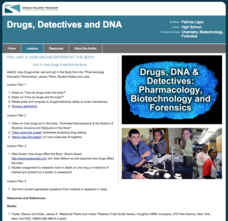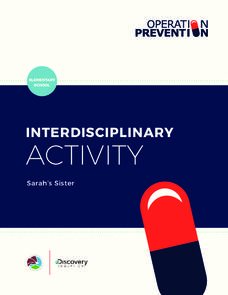Foundation for a Drug-Free World
The Truth About Drugs
Teenagers hear many messages about drugs from advertisements, their peers, their teachers, and their parents. But who is lying? What is the truth? A thorough, thoughtful unit takes a purposeful look at drug education, drug culture, and...
Nemours KidsHealth
Drugs: Grades 6-8
What happens to your body when you use drugs? What do you do if your friend wants you to start using? Learn about the signs of addiction and the ways to withstand peer pressure with two classroom activities. After storyboarding the...
Council for the Curriculum, Examinations and Assessment
Drugs Awareness
Peer pressure can lead to dangerous activities for the eighth graders in your class. Prepare them for the tough conversations in the years ahead with a set of lessons about drugs and their consequences on users' lives.
Kenan Fellows
Unit 3: How Drugs Enter/Exit the Body
The third of a four-part series on Pharmacology teaches scholars how drugs enter and exit the body, how they act inside the body, how they affect the brain, and more. Over the course of the unit, groups complete two labs and one...
US National Library of Medicine
Drug Use and Abuse: Past and Present
Pick your poison: tobacco, alcohol, opiates, cocaine, or marijuana. An online exhibition launches a research project that asks groups to select one of the five drugs and gather information on how the use of the drug and the regulations...
American Physiological Society
Drug the Water Flea
This is a flea. This is a flea on drugs. Any questions? Your class will have questions aplenty during an impactful experiment. Lab groups get to know Daphnia magna, the humble water flea, and study the effects of stimulants and...
National Education Association
Rx for Understanding: Preventing Prescription Drug Abuse
Did you know more than 2,000 teens begin abusing prescription drugs each day? Ensure your learners are educated about the crucial health issue of prescription drug abuse with this unit.
Council for the Curriculum, Examinations and Assessment
Drugs Awareness
The final lesson in a series of 10 focusing on Social, Physical, Emotional, Cognitive and Spiritual (SPECS) health investigates the effects of legal and illegal substances, their risks, and the consequences of their misuse.
Nemours KidsHealth
Drugs: Grades 3-5
Two lessons take a close look at drug prevention. The first lesson, split into two sessions, challenges learners to gather information from an article, answer questions, then create a poster that encourages others to stay away from...
Council for the Curriculum, Examinations and Assessment
Drugs Awareness
Legal and illegal. Use and misuse. Risks and consequences. Myths and facts. Class members investigate the effects on the body of various drugs, including cannabis, nicotine, and alcohol.
Generation Rx
My Generation Rx: Plot Twists
How can prescription drugs be dangerous if they were prescribed by a doctor? Is it okay to share your prescription drugs with friends if they really need them? Clear up any common misconceptions about prescription drugs with a set of...
Department of Education (Ireland)
Consequences
11 lessons, designed to be used in consecutive order, ask middle and high school scholars to consider the effects of various drugs and the consequences of taking them for themselves and their families. They also develop the communication...
PBS
Stories of Painkiller Addiction: Decisions and Consequences
Teach young learners that most drug addictions end in one of three outcomes: treatment, jail, or death. After watching a short video segment on the consequences of drug abuse, class members discuss what they viewed and consider what...
University of Minnesota
Dendritic Spines Lab
This is your brain on drugs ... literally! Your neuroscientists-in-training examine the evidence of drug use on the human brain and how neurons change their connectivity when altered by drugs. They then work together to create testing...
PBS
Stories of Painkiller Addiction: Contemplating Nature vs. Nurture
Does having an addict in your family make it more likely to become one yourself? Explore the genetic risk factors, as well as the prominent environmental influences, for substance addiction in a lesson that encourages awareness and open...
National Association of School Nurses
Learn to Be Smart and Safe with Medicine
The stated purpose of a school tool kit is to help schools implement teen prescription drug abuse awareness programs. The kit includes actions that groups can take in the school, with parents, and in the community at large.
PBS
Stories of Painkiller Addiction: The Brain on Autopilot
For some people, the force of addiction can be as biologically compelling as the drive for food or water. High schoolers watch a video segment about Ryan, a recovering addict, and learn more about how opioids and other drugs can affect...
RAND Corporation
Project ALERT
Why do people use drugs? What are the consequences? The alternatives? How can young people resist the pressures to use drugs? The Project Alert drug prevention program provides middle schoolers with the information they need and the...
Kenan Fellows
Unit 4: The Brain
Drugs interact with the brain to alter moods, emotions, and behaviors by changing the brain's chemistry, perceptions, and interactions. The final lesson in the Pharmacology unit shows scholars experiments, has them complete four labs,...
Florida Department of Health
Understanding the Risk of Substance Abuse Unit
Teenage brains are different! Understanding that the teenage brain is still developing and thus more impacted by substance abuse is the key concept in a three-lesson high school health unit. Participants learn about how the brain and...
Discovery Education
Our Brain and Body on Opioids
Use a presentation that explores the world of prescription opioids. Learners look at the way the brain responds to the drugs and the long terms effects opioids have on the brain and body. At the end of the lesson plan, groups create a...
National Endowment for the Humanities
Albert Sabin and Bioethics: Testing at the Chillicothe Federal Reformatory
Do the ends justify the means? Getting a drug approved in the US is a long and involved process. But at some point out, it involves testing on humans. The ethics of such testing is the focus of a resource that uses Dr. Albert Sabin's...
Discovery Education
Sarah's Sister
Does it matter where medication is stored in your home? Absolutely. The best way to identify proper and improper storage of medications is to participate in different role-play scenarios. A lesson models the safe storage of medications...
Children’s Hospital of Philadelphia
Learning From Animals
Is all research on animals bad? Learners use a video to understand how animal research benefits humans. Pupils read about a drug modification turned deadly and the result of the 1938 Federal Food, Drug, and Cosmetic Act. Scholars use a...
Other popular searches
- Drugs and Alcohol
- Say No to Drugs
- Drugs & Alcohol
- Illegal Drugs
- Alcohol Drugs
- Alcohol Tobacco Drugs
- Smoking and Drugs
- Prescription Drugs
- Depressant Drugs
- Drugs, Alcohol and Tobacco
- Addiction to Drugs
- Drugs Brain

























